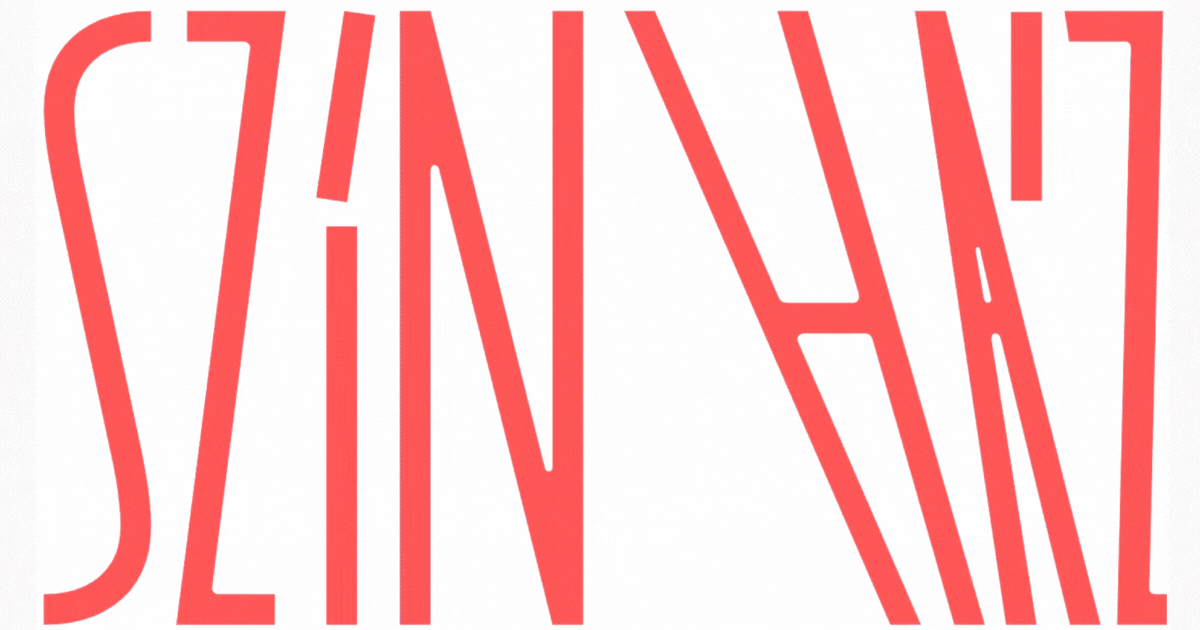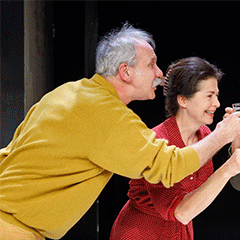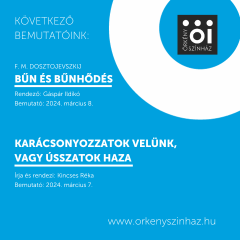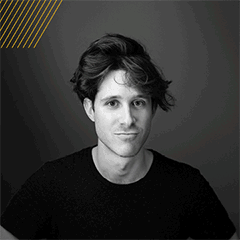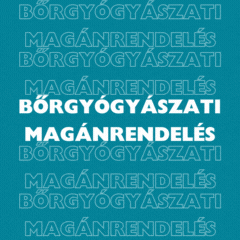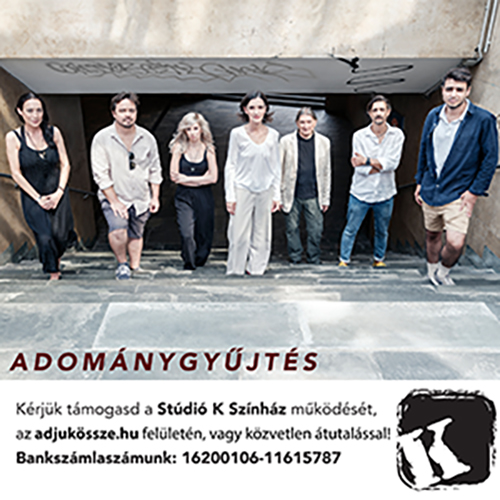I consider myself a citizen of the world
In our upcoming project of American – Hungarian collaborations we would like to deal with the problem of how to approach the question of PC (political correctness) when it comes to the performing arts? More and more debates are centred around ”diversity” and how diversity appears in the performing arts: who are the performers, directors, writers? What about representation? How can we reconcile aesthetic freedom and the ethical need for diversity? Laszlo Upor talks with USA-based creators, theoreticians and university professors about these important, actual and difficult questions in our new series of interviews.
Raymond O. Caldwell, Artistic Director of Theater Alliance in Washington DC., in conversation with Laszlo Upor, dramaturg, translator and University Professor from Budapest.
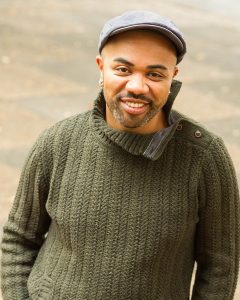
Raymond O. Caldwell. Photo: C. Stanley Photography
– The first line of your CV says you were born in Germany and raised all over the world.
– My mother was based in Germany and as a Filipino family we have relatives all over the world. I lived with my mother until I was in my teen years, then I went to go live with my father in the US, and I lived with my aunt for a while, so it was a childhood of being raised in lots of different places.
– You are lucky to have so many cultures in your blood and in the air you breath. That’s a real gift. What is your national/ethnic identity then? Are you a Citizen of the World? Are you American? German?
– I always considered myself a citizen of the world. I have such love and devotion to Germany and German culture because it was my childhood. And then I came to the United States and learned so much more about that other half of who I was. And that included the African American culture, that included queer and gay culture, that included Filipino culture, that included Filipino American culture, which in its own is a very specific culture, so it’s been a real privilege. Yeah, I consider myself a citizen of the world.
– How many languages do you speak?
– Only – well – only one. I understand and speak German. I feel such respect for the language because it’s such a beautiful language, such a specific language, such a difficult language. I would disrespect it to say, I speak German well. And I don’t speak Hoch Deutsch. But can I navigate Germany? Yes. And people often, when they hear me speak German, are a little surprised, because I also speak German with a Schwäbisch accent, so you hear the Southern words and Southern affectations as I speak, and people see me, this Black Asian guy, and they are, like: Ah! How do you do that?
And I understand a little bit of Spanish because I was raised in Miami as well. But to say that I speak a language means that I can communicate fully and express every single part of an idea, and I don’t think that there are many people in the world that can do that, because I think language is such a gift that way. So, I understand several languages, I speak one language very well.
– There is a line in Tony Kushner’s Angels in America: „America is a melting pot where nothing melts”. How would you comment on this?
– I think that the idea of a melting pot was a really beautiful one. And it was a beautiful idea I think if there was something to heat all those elements. But what I’ve learned in my time in America is that there isn’t that something that is heating all those individuals to melt them and to make them one. So, you have that collection of fragmented pieces that can never fully mix and are seemingly fighting and struggling because they are constantly bumping into one another in this pot that isn’t melting them. So, I fully agree with that. I think though that the goal, the beautiful goal, for America to continue to articulate is the quest to make that pot boil. To make that pot hot. And the possibility for that in America is there. If only the elements could work together to make the pot heat up.
– Perfectly shaped answer. Almost feels like you were prepared, you expected this question…
– Since I was fifteen or sixteen my mom has been asking: “Ok, when are you gonna come home to Germany?”. And it would make sense for me to go back and build a career because I could bring in all those outside elements, and it would be funded by the government. So, it would be a life at its easier. But I’m fascinated and have always been fascinated by America. Because, I think, the possibilities are there and just watching it trying to work and figure itself I am fascinated with.
– Most of us agree that there haven’t been a fair representation of all the subcultures and minorities. What do you think the way would be to change this radically? In other words: do you believe in affirmative action or quotas or the kind?
– That’s a tricky question because the placing of quotas is just an easy scientific answer. It’s a way for us to check out the box but it doesn’t always work for the people who exist in those communities.
– And it would also include listing and labelling people, which is not something we’d probably like.
– It gets really-really dicey because what happens if people identify or don’t identify with different parts of their own identity and personality. I often think about family because it’s the smallest unit of a society. And I happen to have a very large family. I have twelve or thirteen siblings. So, making that society work, the smallest unit of a society, is really difficult. Because in this dozen we are all very different types. I always think about how do you create space for everyone? All those twelve individuals deserve space because we’re saying, we are part of the society. But you actually have to create mechanisms for all twelve of those separate pieces to feel like they are being heard and to feel that they actually have action and things can happen for them. And I think that’s not always the case as we begin to think of how do we solve our race issue. The problem with the quota is that the quota doesn’t take into account fully all twelve of those individuals as they identify, as they see themselves. So, I often think about how we are measuring our community and listening to our community, making space for people to share what it is they want and/or need. But that takes work and that takes listening.
– Not ignoring important issues and problems, on a personal level I find it really difficult to understand how people can not enjoy the multitude of cultures, the endless variations.
– Some people are afraid. Some people have fears as a by-product of how they’ve been raised, as how they’ve been cultured in the world. Part of our work as artists, part of our work as academics, as individuals and writers is to expand the ways our communities are thinking. So that they don’t have those fears. So that those ignorances somehow collapse. That takes time. That takes planning.
– The question is: do we have the patience to get there? Do we have the time?
– I wonder if we have the time in a capitalistic world that is driven by product. The thing about social development, the thing about expanding people’s minds is that every once in a while, you have to fail, you will make a mistake, you move backwards then you move forwards. And it seems that in this capitalistic-driven world we live in, when you make mistakes, you immediately need to course correct. And we course correct so quickly that we don’t actually take the time to learn from the mistake. And when we are talking about people and mistakes with people, we actually start thinking about how much we are hurting people, traumatizing people, those number of things, so it’s a conundrum. Do we have the patience? Probably not in this capitalistic world. But do we have time? And time is an interesting thing, because time is going to go on, even after you and I. And so when I rethink about the major success we may have as a society, globally as the world, I’m fascinated. Because sometimes we only want to measure success and think about success within the last 30-40-50, maybe100 years, but I often think about the span of humanity. There was a moment when rampant slavery was just normalised all over the world. The truth of the matter is that we exist globally in one of the safest times in our recorded and known history. But when we talk about progress in a capitalistic way, we cannot hold it: “we’re gonna fix it, we’re gonna fix it, we’re gonna fix it…” We harbour on all things we are not fixing and it makes us feel like we’re not going anywhere and it’s not getting any better.
– Absolutely. But by asking “do we have the patience’” I also meant that we’d all like to see the result, the outcome of our actions. We want to see progress that is partly initiated by our actions. And it’s frustrating to know that you will not see the consequences. Architects in old times who started building a cathedral knowing that they will not see it finished because it will take a century and a half were, apparently, still happy to initiate, to design, to contribute. And by asking if we had the time, I also meant that one is worried about the future of this planet. So: do we have the time to work out a unity, some kind of unity, a collaboration of humankind to solve those problems?It seems that we should hurry to clear the intercultural etc. conflicts before it’s too late.
– I was raised watching science fiction films and I often think that we globally need a shared enemy. Until we as humanity have an enemy seemingly, for some reason, our animalistic brain wants to see one another as animals. The thing about global warming: it’s an idea to the people, it’s not something that is tangible, it’s not the enemy that they can see every day. So, I’ve often been thinking about how do you unite the world, and part of my brain says we need a shared enemy.
– But isn’t that a very dangerous idea, since so many autocratic leaders/politicians are only too busy to build on this instinct and create “enemies” in order to get in or stay in power?
– I meant shared enemies like “Aliens”. (laughs) Sometimes we abandon the fact that we are animals. We’re trying to survive, so out of survival, out of necessity our brain is wired in a way that the uniting thing we all have as humans we’ll only recognise when we have something outside that we all say: that is not us and we have to protect ourselves.
– Many agree that there are so many stories never told, so many cultures, subcultures that have never been represented and it’s high time to tell those stories, high time to represent those people. And I wonder what the best way would be. Shall each of us tell our own so far missing stories – you tell yours and I tell mine – and by this, eventually, we have all the stories on the table? Or do we exchange stories, that is, I tell yours and you tell mine, so we’d learn the other one while doing it?
– I often think that you and I are the best vehicles for our stories, our narratives. Because only you and I can emotionally connect and understand, and understand the nuance, of our own story. So, I think it’s so fundamental for communities, individuals even, to tell their own stories. But for me the most important step is that next step. Because it’s not just enough for you to tell your story and for me to tell my story, and us walk away. There has to be a third point where someone who heard your story and someone who heard my story now makes a new story. Because that is how the story moves forward, how the story advances, it’s how our individual stories become better. So, I think that first step is, yes, tell your story. But the second step is someone being inspired and telling that story and telling a new story.
– It’s all about trustworthiness and authenticity, right? Still, I could argue that, yes, you are the best presenter of your own story, and that’s very instructive to me, on the other hand my trying to tell your story would help me, force me even, to identify with your story, with your background, with your culture. And this is equally instructive – or, maybe, even more instructive in a way then just watching you telling your own story. But, obviously, your version of the “second step”, is the most important part.
– I think about how audiences experience stories very often. It’s very important for me as a storyteller, and for us storytellers in general, that we’re looking to connect and then expand someone’s perspective. So, when I’m telling you my story there are whole parts of my story that you won’t understand. That you in your mind’s eye and imagination create what it looks like. And you hold a very different picture than I hold. And so, when you go and tell my story, the way and the mode in which you tell my story are coloured purely by your own perspectives, by what you are able to hold in your mind. What I find so beautiful about that third party on the outside – listening to your story and my story– is that they begin to be inspired by all the colours and all the pieces of both of our stories and then add their own perspective. I think about that because I always think about what makes a good story. Just because you have a story and I have a story that doesn’t mean it’s a good story others want to hear. (laughs) So, I think what makes a good story is actually that third person because that third person among the three of us is the most gifted now. Because they have perspectives: two other perspectives and now their own.
– Happy is the future. None of us was a king in ancient Greece, nor a master builder in a Nordic country – or a lovestruck adolescent girl in sunny Italy, for that matter – still, we think we can fully connect to Oedipus or Solness or Juliet. And nobody will frown. The present may, sometimes, be more complicated.
If you come to Hungary where there are no people of colour among the actors and opera singers and see that our National Opera produced, let’s say, Porgy and Bess with white-skinned singers, what would your reaction be? (A true story from few years ago: the show was banned by the agency because it had a white cast.)
– This is a tricky question and a good intellectual exercise. Because I see the benefits of Hungarians experiencing this story. What’s tricky is in this digital age: we are so interconnected. I often think about how a community outside of Hungary sees that, how they might receive that, how they experience what they purely see on the images. The intent was to spread culture. The impact was: people around the world, particularly black people, say: “This is rude, this is a black role that should be played by black people”. The intent: we don’t have many black people in our country. The impact is still harm. Once upon a time when we did not live in a globally connected world and a village in Hungary was presenting this, that community could grapple with the art alone. The tricky thing now as we develop theatre is that even though we always say it’s a live medium, it’s for this community, the echoes of it echo throughout the world.
– But theatre or opera is, yes, a live medium for live audiences – so now you are saying that Hungarian audiences won’t see Porgy on stage.
– Why not be imaginative in the way you do solve the problem? If you have no black singers, why not bring artists to Hungary to solve the problem? Why not digitize the experience so the black singers would live-fed into? Because the greater cultural impact is also seeing black people not just imagining that they are black. Why diminish the fact that these people were written as black people? And if you really have no Hungarian speaking black actors, then why produce the play at all? The major construct of the play is that these are black people.
– Suspending your disbelief is necessary when you watch an ancient Greek play or Hamlet. You know that the characters on stage are not really Mediterranean or Danish monarchs.
– Suspending disbelief is a core part of theatre. But I don’t think we suspend our disbelief about who people are. About the race of people. We see, we are not blind. It’s not that we’re going to hear Porgy and Bess. If you’re gonna close the curtain and everyone’s gonna sit and listen, sure, then we are really using our imaginations. But to say that we are going to imagine that people are people of colour, that doesn’t hold water for me. Because theatre and opera are visceral, it’s live in person and because it’s visual, it is important that we see those people.
And so, the greater question to me is why the company produces Porgy.
Because when we produce live art, we are attempting to start a conversation in our community. At least that is the function of art as I see it. I’m not interested in art that we just sit by and pat ourselves on the back and think: “Oh, I had a wonderful cultural experience!” I can now sit at home and seemingly do that. If we are trying to have a visceral conversation with our audience, what is the conversation we are having?
– For over three years you have been artistic director of Theater Allience, an important company some people may have not heard of. Would you, please, help them a little?
– Theater Allience is, I believe, producing some of the coolest theatre in Washington DC. And it is cool because it ispeople for people driven to start conversations. The conversations that we feel we aren’t prepared to have. But more than that, we are trying to get our audiences involved into the ideas. It’s not enough just to come to the theatre and say: “Oh, racism is wrong”, and you leave. If you believe that, then you should tangibly get involved. I’m really excited about the work we produce and the ways in which we are working within our community.
– What is your definition of applied theatre?
– Applied theatre in the modes I use it in my own work is about taking what it is that theatre does and what theatre produces. Both as we are making theatre – the skills of making theatre – and also the impact of theatre, the impact of theatre in audiences. Taking those core ideas and applying them then to real life situations. An example: I work with an organisation for young people with disabilities, called Broad Futures. We are trying to teach young people as they move into their careers how to navigate space. And the skills of theatre actually can give them some real-life skills as they are navigating the world. So, it’s about taking those ideas, those theories, those skills, and teaching young people to apply them to their real lives. Not that they can make plays but that they can navigate the world in healthy ways.
– Do you believe that theatre, or art in general, could make a difference? That it should make a difference?
– The art I’m interested in making does just that. I think that it’s really important to have a place and a space for just art for art’s sake. It just so happens that it’s never the art I’m interested in making. And so: should there be a space for that? For sure. I just don’t make that. I always want to know that the art I am making in some way is generating a conversation. And not to say that I’m outside measuring that. But as I am creating it, in the pursuit of that I’m always thinking about the ways in which our community is somehow having a conversation and then growing because of the work.
– Do you get the everyday response, feedback necessary to be able to go on?
– I think that feedback comes in any number of modes. That feedback comes in the process as I am creating with designers and actors in the room, but I think then also feedback comes from organisations I am working with, and from audiences. I often say that my work is, if nothing, clear. I have a clear point of view that I am presenting, and you might not agree with it, but it is clear. And the work that I create is often, in ways, jarring. It’s uncomfortable. I love uncomfortable conversations. Because I think that’s the only way in which we are gonna get better. It’s the only way I got better. So, I receive that often. Especially when people don’t like my work. (laughs)
– Have you ever been censored/banned?
– The joke that I always have with my husband is that I just keep waiting to get cancelled. I keep waiting for the moment.
– Waiting-waiting… in vain, cause that famous moment just doesn’t want to arrive.
– Yes! (laughs) I think that I am a personality and a type that is rife for cancellation. I think it’s only a matter of time that something that I’ve said or written is simply pulled and taken out of context. Often times when we think about what cancelling is, it’s about taking a moment in someone’s existence and defining that as the whole of who they are. And because there are so many sound clips and bites of me in conversation and interviews and and and… I often think it’s only a matter of time. I think that for those who seem themselves as creating this type of work it’s about guarding themselves for when that actually happens.
– Have you ever practised self-censorship?
– No. I’m often the one who says exactly what it is that I think. But I will say that I often think before I speak. I try to measure what it is that I say because I think that some of my ideas an individual might not yet be ready for. So, I don’t censor myself but I’m always aware of my audience.
– You may probably stop yourself from saying something you think could hurt too much.
– Sometimes truth is hard. I am a guest director at a theatre company now. And sometimes as they are taking us through their “anti-racism training”, it feels like an utter waste of time, because it feels that they are simply checking boxes. It would not be wholly productive for me to say “Throw it all out and start all over again. This is shit!” Because I see the effort. So, how do I measure what I say to build them up and also improve what it is they are doing. I often think about, when I’m opening my mouth, doing just that: how am I building and not tearing down.
– Is there a red line for you where you would be ready to ban something or someone because you think it dangerous or ugly or hurting others?In other words: can you imagine yourself in the position of a censor?
– No. (a short pause) It’s hard for me to think about censorship. Even with ideas. There’s a lot in this world that I don’t agree with. But I don’t agree with censoring either because I think that censoring is just the illumination of the idea that we’re gonna imagine that is not there. I’ve been thinking about this. Because in America there is this whole moment of let’s tear down every single horrible statue that ever was. As opposed to let’s move those statues into museums and then put them side by side with more statues. That’s not about censorship. That’s about expanding the conversation. But also, so we could hold perspective. It’s important to understand and hear things we don’t agree with because it ultimately expandsand supports our own ideas. Or changes and grows our ideas. So, no, I don’t believe in censorship. I’ve stood by and heard a lot of shit I don’t agree with, but I wanted to listen.
– When talking about “fair representation”, or the lack of it, we are talking about hundreds of years of the privileged dominating the space. Now, in order to create an even space for everyone, how much of it should be some people “giving space” and others “gaining space”? In other words, people who are descendants of the privileged, thus (without wanting) being privileged themselves, should shrink and find smaller corners for themselves or, rather, should the “more recently arrived” claim space aggressively? What would be the healthy balance between these two?
– I think it actually exists somewhere right in the middle. Those of the privileged class who have been part of the whatever tradition, of the mainstream tradition, should be thinking about ways in which they are wanting to make space for others. And that doesn’t ask you to become smaller or shrink, that asks you to look around and go: who’s missing right now? Who else in this world needs to be sitting in this theatre right next to me who doesn’t have the privilege to do that? So, thinking about: I have the privilege, how do I get more people here? And by the same token those who have not, traditionally, been in that space aggressively taking up space is incredibly important. But also: recognising that that space is for you. So, I think that that asks artmakers, that asks us, to actually meet audiences who have been disenfranchised where they are. For some reason we continue to think that “Well, the disenfranchised: the doors are open, why don’t you just come into our institutions? Just come to the opera house. Just come to the theatre.” But if that space has never actually been created for them, they won’t be able just barge right in. Maybe a few would.
– Some wouldn’t even find the entrance.
– Right. Right. Because even the entrance and the traditions of those spaces they’ve not been taught or shared. So, I think it asks us as artists to go and meet those communities where they are. Not to just open the door but to make spaces where they already are. And then while we’re there, go “Hey! Look over there, that space is for you too.” Theatre is a dying tradition. Opera is dying. Audiences aren’t coming. Because the privileged class who has been in those spaces aren’t doing the work of going: we want more people here with us. And because they are not doing that, our audiences are dying off. And younger audiences think now that those are spaces for Grandma and Grandpa. So, I think it asks us all to do a little work to make space and for folks to aggressively take space. But to take space they have to know that that space is there.
